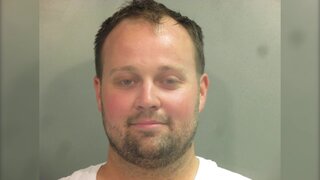Create a free profile to get unlimited access to exclusive videos, breaking news, sweepstakes, and more!
Josh Duggar’s Attempts To Have Child Sexual Assault Images Case Dismissed Over Trump Appointees Deemed 'Frivolous'
Former reality TV star Josh Duggar’s defense team had been hoping to suppress statements he made to federal investigators when they swarmed his used car dealership in Arkansas in November 2019.

A federal judge has called out Josh Duggar’s defense team’s attempts to have his child pornography case thrown out because of unlawful appointments former President Donald Trump made to the Department of Homeland Security, calling them “frivolous” this week.
Although United States District Judge Timothy L. Brooks formally denied multiple motions to suppress evidence and dismiss the case during an in-person evidentiary hearing on September 27, a new court order on Wednesday goes into further detail about why Brooks decided to deny the motions.
Duggar, who once starred in the TLC reality series “19 Kids and Counting,” is facing charges of receiving and possessing child sexual assault images, including dozens of photographs and videos with some images of children “as young as toddlers.” He was arrested by federal authorities in April.
His attorneys filed a motion to dismiss the case after noting that the federal agents involved in his criminal investigation had been acting under the authority first of Acting Secretary Kevin McAleenan and then under Acting Secretary Chad Wolf. The Government Accountability Office later determined that former President Donald Trump had appointed both men unlawfully after failing to receive congressional approval for the leadership role appointments.
Duggar’s attorneys argued that because the appointments had been “deficient in some way,” the entire criminal investigation into Duggar should be thrown out because of the violation of the Appointments Clause of the U.S. Constitution, the court records state.
Brooks called the argument “frivolous” as he dismissed the attempted legal maneuver.
“Department of Homeland Security agents are sworn to enforce federal criminal statutes, and the Court is not aware of any reason why their authority to investigate crimes would somehow be undermined if the acting secretary of their agency was improperly appointed,” he wrote.
Brooks also noted that a grand jury had also opted to charge Duggar after reviewing the evidence against him.
“There is no legal support for Mr. Duggar’s claim that an indictment handed down by a properly impaneled grand jury would be subject to dismissal due to an alleged Appointments Clause violation,” he said.
In the same order, Brooks explained why he had also denied other defense motions to suppress evidence in the case.
Duggar’s defense team had been hoping to suppress statements he made to federal investigators when they swarmed his used car dealership in Arkansas on November 8, 2019 to serve a federal search warrant on the property.
Although Duggar initially pulled his iPhone 11 from his pocket and said he wanted to contact his lawyer, Department of Homeland Security Special Agent Gerald Faulkner seized the phone before he could make the call as it was covered under the search warrant, according to the court documents.
Duggar later agreed to speak with two agents in one of the vehicles without his attorney present and signed a waiver that he had been read. As the interview got underway — and before Faulkner could begin recording the conversation — the agent testified that Duggar had immediately asked “What is this about? Has somebody been downloading child pornography?”
The agents say they asked him to stop asking questions before they could record the interview and then recorded the remainder of the 51-minute interview, which captured Duggar allegedly saying that he’d agree to speak to the agents without his attorney.
“I mean, I may not answer everything I guess, but, yes,” he said in the recording, according to the court order.
Special Agent Howard Aycock told Duggar that he was not under arrest and was free to go at any time.
While Duggar’s defense team had contended that he had invoked his right to counsel when his phone was first seized, Brooks denied the motion, noting that Duggar had, in fact, been free to leave at any time and did not meet the definition of being “in custody” while speaking with the agents. Therefore, he said, Duggar was not protected by Miranda rights.
“The fact that he was given Miranda warnings or asked to sign a form confirming his understanding of these warnings is not determinative of the in-custody inquiry,” Brooks wrote.
Brooks also said that throughout the interview, Duggar answered some questions and refused to answer others, suggesting that he was well aware that he was not being forced to comply. He also denied a motion to suppress photographs of Duggar’s hands and feet, which had been taken after he surrendered to law enforcement on April 29.
“There is no legal authority to suggest agents needed a warrant before they could photograph Mr. Duggar’s hands and feet,” the judge wrote, adding that it had been part of the booking process, much like fingerprinting. He also dismissed another motion by the defense team suggesting that the prosecution team had failed to preserve potentially exculpatory evidence in the case.
The case against Duggar is slated for trial on November 30.





















